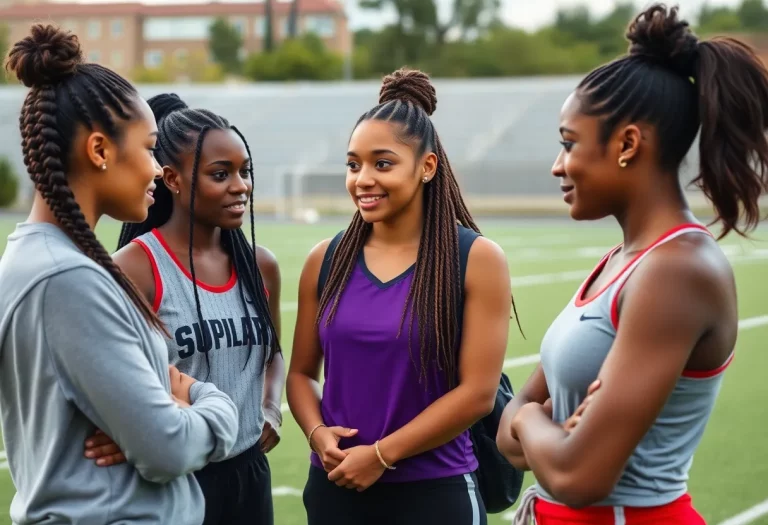News Summary
In Southern California, three female student athletes have filed a federal lawsuit against a school district and the state education department over transgender athletes’ inclusion in girls’ sports. They argue this violates Title IX and creates an unfair playing field, impacting their competitive opportunities. Their concerns also encompass privacy issues in shared facilities. The lawsuit comes amid growing national discussions on fairness in sports for transgender athletes, as the plaintiffs seek damages and an injunction against male students competing in female categories.
Three Female Athletes Take a Stand in California Over Transgender Inclusion in Sports
In a significant development from Southern California, three female student athletes have made headlines by filing a federal lawsuit against a local school district and the state’s Department of Education. This lawsuit is stirring up conversations far beyond the immediate community as it brings to light the complexities surrounding transgender athletes participating in sports.
The Lawsuit’s Core Claims
Filed in the U.S. District Court for the Central District of California, the lawsuit claims that the inclusion of a transgender athlete in girls’ high school sports constitutes sex discrimination under Title IX—a fundamental civil rights law that prohibits discrimination based on sex. The plaintiffs argue that allowing this athlete to compete has led to an unfair playing field and has infringed upon their rights, raising alarms about athletic fairness and the opportunities available to female competitors.
While the transgender athlete involved is not named in the lawsuit, descriptions align closely with A.B. Hernandez, a senior athlete at Jurupa Valley High School. Hernandez faced significant backlash during May’s track and field championships, including legal threats as pressure mounted around the participation of transgender sports in high school leagues.
Claims of Unfair Competition
The plaintiffs, including Madison McPherson, Alyssa McPherson, and Hadeel Hazameh, argue that Hernandez’s involvement in competitions significantly affected their standings. They point out that after Hernandez’s participation, at least six schools decided to forfeit matches against the Jurupa Valley volleyball team—an action that many feel deprived the plaintiffs of competitive opportunities.
Moreover, the lawsuit highlights uncomfortable scenarios that arose from shared locker room facilities. The athletes express concerns over their privacy and the emotional discomfort associated with sharing spaces with a transgender peer, citing specific incidents that have left them feeling vulnerable and harassed.
Concerns Ignored
Despite raising concerns about their situation with school officials, the athletes report feeling disregarded, as the administration maintained a stance of adhering to state laws concerning inclusion. According to the plaintiffs, this response—coupled with their previous experiences of feeling isolated within their own sports teams—has contributed to a growing sense of injustice in the sporting arena.
There’s a broader conversation happening on the national level about transgender participation in athletics, particularly as Republican leaders and the former Trump administration have initiated discussions around the topic. The lawsuit reflects these wider debates, as opponents of transgender athletes competing in women’s sports claim that they may hold physical advantages that could skew fair competition.
The Road Ahead
The athletes are seeking unspecified monetary damages along with an injunction that would prevent male students from competing in female sports categories. By citing violations of Title IX and the Equal Protection Clause of the Fourteenth Amendment, they’re taking steps toward ensuring that the rights and opportunities of young women in sports are upheld.
This case not only underlines the athletes’ frustrations but also brings to light the ongoing tension between the values of inclusivity and fairness. Advocates argue against the notion that transgender women possess advantages, stressing the need for comprehensive research and understanding.
Life After Lawsuit
As the lawsuit unfolds, the personal experiences of these athletes illuminate their struggles and the emotional turmoil that now accompanies their participation in sports. Madison McPherson, for instance, found herself discouraged from training after a run-in with Hernandez, fearing further losses. Hazameh shares similar sentiments, feeling they could not overcome challenges posed by Hernandez’s perceived biological advantages.
Meanwhile, the push for athletic integrity versus inclusion continues to echo through the hallways of schools across California and beyond. With ongoing discussions and potential implications for many, this lawsuit may influence not only local policies but also contribute to a national conversation about fairness in sports for all.
Deeper Dive: News & Info About This Topic
LIVE BALL Resources
Inclusion of Students with Disabilities in Madison Swim Team
Jason Hall Begins Cross Country Season at Lee Williams High School
Big Rapids Welcomes New Girls Tennis Coach for 2026 Season
Stanberry Coach Recognized as 2024-25 Girls Track Coach of the Year
Jurupa Valley Faces Legal Challenge Over Transgender Athlete Inclusion
Legal Battle Erupts Over Transgender Athlete Participation
Controversy Over Transgender Athlete Participation in Jurupa Valley
St. Paul Discusses Transgender Athletes in High School Softball
Minnesota Girls High School Tennis Welcomes Third Class
Transgender Athlete Sues Swarthmore College and NCAA
Additional Resources
- WPTZ News
- Wikipedia: Title IX
- NBC Bay Area
- Google Search: Transgender Athletes
- ABC7 News
- Google Scholar: Transgender Inclusion in Sports
- LA Times
- Encyclopedia Britannica: Athletic Fairness
- SF Chronicle
- Google News: Transgender Athletes in High School Sports


